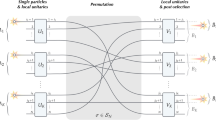Abstract
A photon in an arbitrary polarization state cannot be cloned perfectly1,2. But suppose that at our disposal we have several copies of a photon in an unknown state. Is it possible to delete the information content of one or more of these photons by a physical process? Specifically, if two photons are in the same initial polarization state, is there a mechanism that produces one photon in the same initial state and the other in some standard polarization state? If this could be done, then one would create a standard blank state onto which one could copy an unknown state approximately, by deterministic cloning3,4 or exactly, by probabilistic cloning5,6. This could in principle be useful in quantum computation, where one could store new information in an already computed state by deleting the old information. Here we show, however, that the linearity of quantum theory does not allow us to delete a copy of an arbitrary quantum state perfectly. Though in a classical computer information can be deleted (reversibly) against a copy7, the analogous task cannot be accomplished, even irreversibly, with quantum information.
This is a preview of subscription content, access via your institution
Access options
Subscribe to this journal
Receive 51 print issues and online access
$199.00 per year
only $3.90 per issue
Buy this article
- Purchase on Springer Link
- Instant access to full article PDF
Prices may be subject to local taxes which are calculated during checkout
Similar content being viewed by others
References
Wooters, W. K. & Zurek, W. H. A single quantum cannot be cloned. Nature 299, 802–803 (1982).
Dieks, D. Communication by EPR devices. Phys. Lett. A 92, 271–272 (1982).
Bužek, V. & Hillery, M. H. Quantum copying: Beyond the no-cloning theorem. Phys. Rev. A 54, 1844–1852 (1996).
Bužek, V., Braunstein, S. L., Hillery, M. H. & Bruß, D. Quantum copying: A network. Phys. Rev. A. 56, 3446–3452 (1997).
Duan, L. M. & Guo, G. C. A probabilistic cloning machine for replicating two non-orthogonal states. Phys. Lett. A 243, 261–264 (1998).
Duan, L. M. & Guo, G. C. Probabilistic cloning and identification of linearly independent states. Phys. Rev. Lett. 80 , 4999–5002 (1998).
Landauer, R. Irreversibility and heat generation in the computing process. EBM J. Res. Dev. 5, 183–191 (1961).
Yuen, H. P. Amplification of quantum states and noiseless photon amplifiers. Phys. Lett. A 113, 405–407 (1986).
Pati, A. K. Quantum superposition of multiple clones and the novel cloning machine. Phys. Rev. Lett. 83, 2849–2852 (1999).
Bennett, C. H. & Brassard, G. The dawn of a new era for quantum cryptography: the experimental prototype is working! Special Interest Group on Automata and Computability Theory News 20, 78–82 (1989).
Bennett, C. H. et al. Teleporting an unknown quantum state via dual classical and Einstein-Podolsky-Rosen channels. Phys. Rev. Lett. 70, 1895–1899 (1993).
Boschi, D. et al. Experimental realization of teleporting an unknown pure quantum state via dual classical and Einstein-Podolsky-Rosen channels. Phys. Rev. Lett. 80, 1121–1125 (1998).
Bouwmeester, D. et al. Experimental quantum teleportation. Nature 390, 575–579 (1997).
Furusawa, A. et al. Unconditional quantum teleportation. Science 282, 706–709 (1998).
Deutsch, D. Quantum-theory, the Church-Turing principle and the universal computer. Proc. R. Soc. Lond. A 400, 97–117 (1985).
Gisin, N. & Massar, S. Optimal quantum cloning machines. Phys. Rev. Lett. 79, 2153– 2156 (1997).
Acknowledgements
We thank C. H. Bennett, S. Popescu, S. Bose, L. M. Duan and N. J. Cerf for useful comments.
Author information
Authors and Affiliations
Corresponding author
Rights and permissions
About this article
Cite this article
Kumar Pati, A., Braunstein, S. Impossibility of deleting an unknown quantum state. Nature 404, 164–165 (2000). https://doi.org/10.1038/404130b0
Received:
Accepted:
Published:
Issue Date:
DOI: https://doi.org/10.1038/404130b0
Comments
By submitting a comment you agree to abide by our Terms and Community Guidelines. If you find something abusive or that does not comply with our terms or guidelines please flag it as inappropriate.


